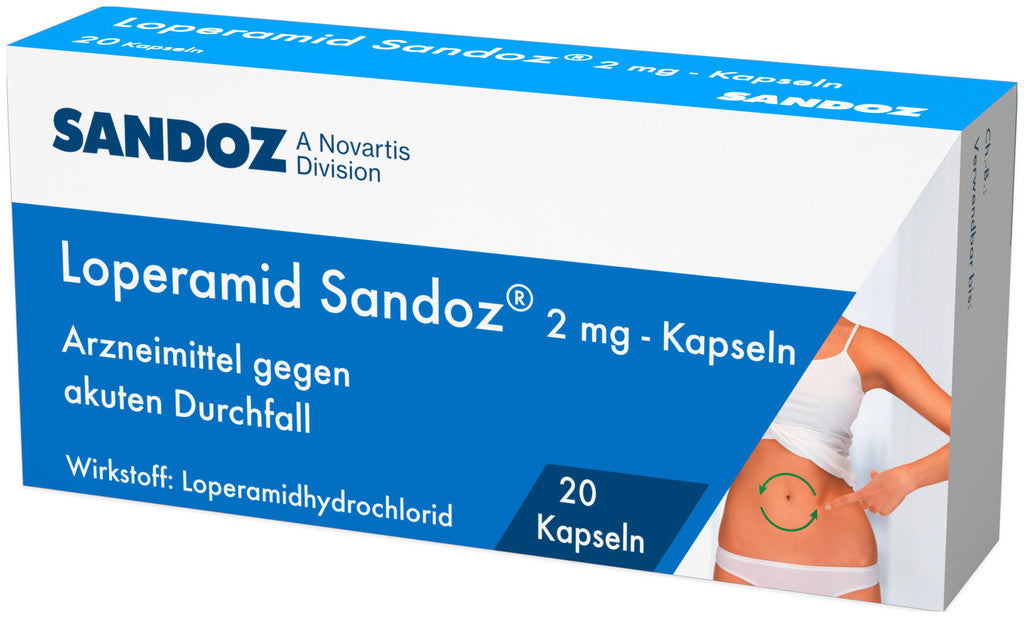Sandoz
Sandoz Loperamide 2 mg 20 capsules
Sandoz Loperamide 2 mg 20 capsules
Couldn't load pickup availability
Loperamide Sandoz is a strong and long-acting anti-diarrheal agent that inhibits the disturbed intestinal movements by directly affecting the intestinal wall (antiperistaltic effect). In addition, the state of tension in the intestinal wall and the sphincter muscle is increased.
Loperamid Sandoz is used in adults and adolescents from 12 years of age for the symptomatic treatment of short-lasting, acute diarrhea that cannot be controlled with other measures (diet, replacement of water and salts) and for which the administration of antibiotics is not indicated.
If you do not feel better or if you feel worse after 2 days, contact your doctor.
Treatment with Loperamid Sandoz for more than 2 days may only be carried out with a doctor's prescription and follow-up.
Contraindications
Loperamide Sandoz must not be taken
- if you are allergic to the active substance or any of the other ingredients of this medicine (listed in section 6).
- in conditions where slowing down of bowel movements is to be avoided, e.g. B. bloated abdomen, constipation and intestinal obstruction
- by children under the age of 12 (see under “Children and young people”)
- in acute intestinal infection with high fever and bloody stools
- in an acute flare-up of ulcerative colitis (ulcerative inflammation of the colon)
- diarrhea due to inflammation of the colon that occurs during or after taking antibiotics (pseudomembranous colitis)
- in chronic diarrhea. These may only be treated with Loperamid Sandoz if prescribed by a doctor and with follow-up monitoring.
interactions
Tell your doctor or pharmacist if you are taking any of the following medicines:
- ritonavir (used to treat HIV and AIDS)
- quinidine (used to treat heart rhythm problems and malaria)
- verapamil (used to treat heart disease)
- ketoconazole (used to treat fungal infections)
- desmopressin (used to control thirst and urine production in patients with diabetes insipidus)
- itraconazole or ketoconazole (used to treat fungal infections)
- Gemfibrozil (used to treat high cholesterol)
Medicines that reduce gastrointestinal motility can increase the effect of Loperamid Sandoz.
Concomitant use of drugs used to treat heart disease (quinidine, verapamil) or antifungal drugs (ketoconazole) may provoke signs of respiratory depression.
Taking Loperamide Sandoz with food and drink
Swallow the capsules with some liquid.
Pregnancy and breast-feeding
If you are pregnant or breast-feeding, think you may be pregnant or are planning to have a baby, ask your doctor or pharmacist for advice before taking this medicine.
Loperamide Sandoz should not be taken during pregnancy and breastfeeding. If you are pregnant or breastfeeding, consult your doctor for appropriate treatment.
application
Unless otherwise prescribed by the doctor, the recommended dose is:
For acute diarrhea, adults take 2 capsules at the beginning of treatment and then 1 capsule after each loose stool.
A maximum daily dose of 6 capsules should not be exceeded, since severe constipation can occur.
Adolescents from 12 to 18 years of age take 1 capsule at the beginning of treatment for acute diarrhea and then 1 capsule after each loose stool. A maximum daily dose of 1 capsule per 10 kg body weight (maximum 4 capsules) should not be exceeded, as severe constipation can occur.
No dose adjustment is necessary for elderly patients or patients with kidney damage.
If you have severe liver dysfunction, you should only take Loperamid Sandoz after consulting your doctor and only if prescribed by a doctor.
Duration of use
If, in the case of acute diarrhea, the diarrhea persists 2 days after the start of treatment, you should stop taking Loperamid Sandoz and consult a doctor.
side effects
Common (may affect up to 1 in 10 people)
- headache
- dizziness
- Constipation, nausea, flatulence
Uncommon (may affect up to 1 in 100 people)
- sleepiness
- Pain and discomfort in the gastrointestinal area, dry mouth
- Upper abdominal pain, vomiting
- indigestion
- skin rash
Rare (may affect up to 1 in 1,000 people)
- Hypersensitivity reactions, allergic reactions (including serious reactions such as loss of consciousness or difficulty breathing - anaphylactic shock)
- Loss of consciousness, rigidity, drowsiness, depressed level of consciousness, increased muscle tension, lack of coordination
- Narrowing of the pupils (miosis)
- Intestinal obstruction (ileus, including ileus caused by paralysis), chronic constipation with enlargement of the large intestine (megacolon), burning or tingling of the tongue
- bloated stomach
- Skin reactions with blistering (Stevens Johnson syndrome, toxic epidermal necrolysis, erythema multiforme), sudden swelling of the mucous membranes, especially in the face and limbs, involving the tongue and larynx, possibly with shortness of breath and difficulty swallowing (angioedema), nettle rash, itching
- difficulty urinating
- exhaustion
Some of the reported side effects (gastrointestinal pain and discomfort, nausea, vomiting, dry mouth, fatigue, drowsiness, constipation, gas, headache, drowsiness or dizziness) are common symptoms associated with diarrhea. These symptoms are often difficult to distinguish from the side effects of the drug.
composition
The active substance is loperamide hydrochloride.
1 capsule contains 2 mg loperamide hydrochloride.
The other ingredients are 127 mg lactose monohydrate, maize starch, talc, magnesium stearate, gelatin, colours: patent blue (E131), titanium dioxide (E171), yellow and black iron oxide (E172).
Your order will be shipped within 3-4 business days
Share


